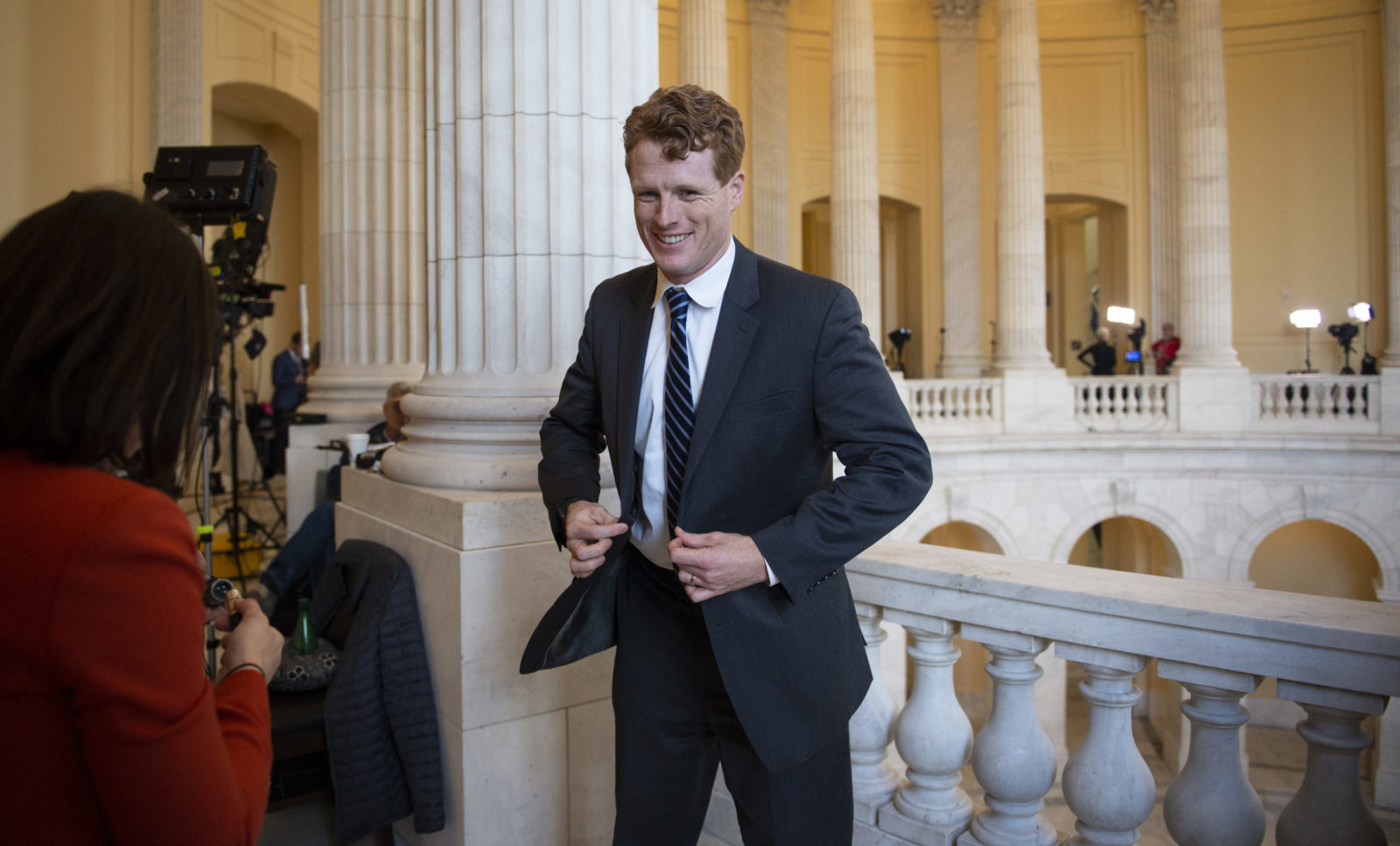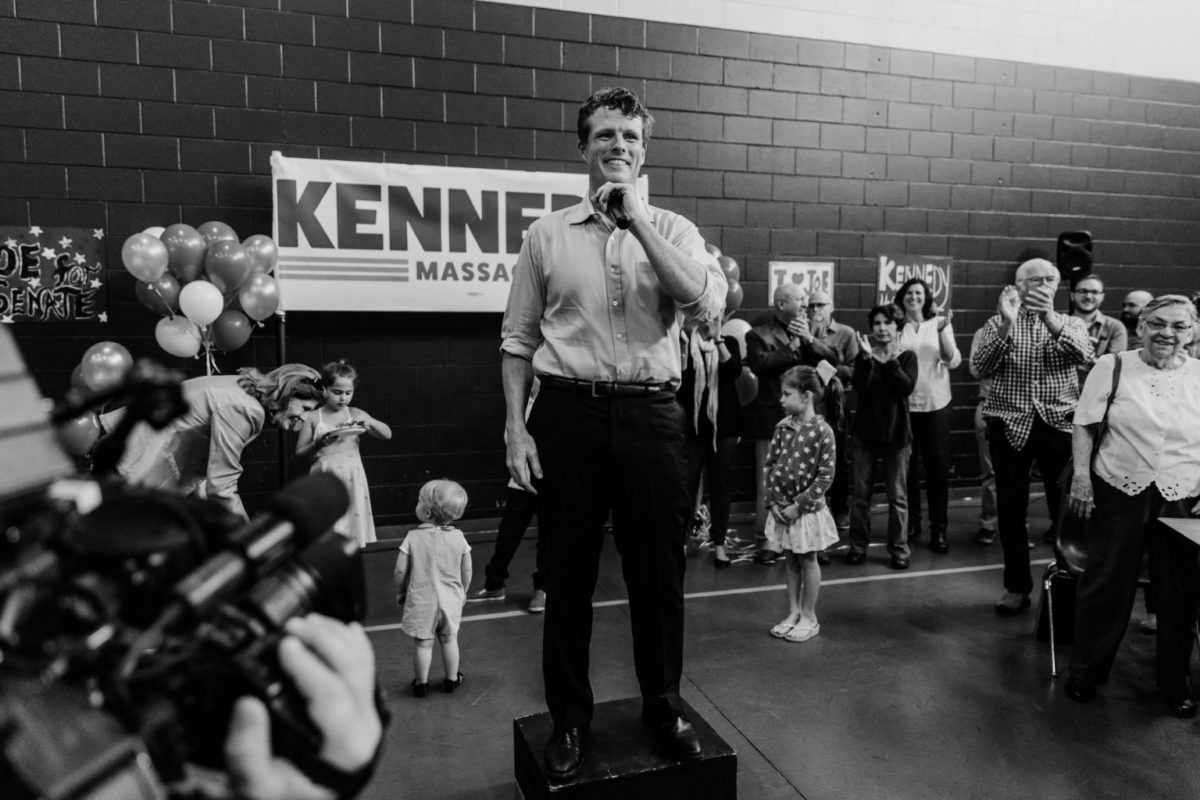
Caroline Brehman/CQ Roll Call via AP Images
Rep. Joe Kennedy vows to bring progressive, pro-Israel values to the Senate
The Massachusetts congressman is challenging Sen. Ed Markey in next week's Democratic primary
It bothers Rep. Joseph P. Kennedy III (D-MA) that he has been cast as the establishment candidate in next week’s Democratic primary, in which he is running to unseat Sen. Ed Markey (D-MA). “By any stretch here, both of us are progressives,” claimed Kennedy, who points out that he has been endorsed by Rep. Mark Pocan (D-WI), a co-chair of the Congressional Progressive Caucus.
“What’s been odd about this is, on the one hand, you have the senator saying he’s the progressive one in the race,” said Kennedy, who, at 39, is nearly half the age of his 74-year-old opponent. “On the other hand, you’ve gotten much of the kind of more traditional media — whether it’s TV or print — saying these policy positions are virtually indistinguishable. Well, OK. Then how is it that one person is a clear progressive and the other one is not?”
Kennedy’s objections notwithstanding, Markey has largely succeeded in shoring up support from progressives in and outside of the district. Markey, a 44-year congressional veteran, touts his co-sponsorship of the Green New Deal in appealing to his progressive credentials, which have earned him endorsements from the likes of Rep. Alexandria Ocasio-Cortez (D-NY) and Sen. Elizabeth Warren (D-MA), as well as groups like Indivisible and the Working Families Party.
Pro-Markey enthusiasm from the far-left flank of the Democratic Party stands out in an increasingly contentious race in which Kennedy’s most high-profile backer is House Speaker Nancy Pelosi (D-CA), who last week broke a longstanding Democratic tradition against endorsing non-incumbents and threw her weight behind her young colleague in the House. (Pelosi maintained that her endorsement was consistent in that she has always backed her House members in their election efforts.)
“The unusual dynamics of this race speak to the populist divisions within the Democratic Party right now,” said Rachel Meade, a lecturer in American politics at Boston University. “Despite being an older incumbent, Ed Markey’s campaign has taken on an underdog feeling, fueled by an enthusiastic network of online supporters, including many young progressives and socialists who supported Bernie Sanders. In an era of unfulfilled populist fervor on the left, Kennedy’s entrance into the race against a popular incumbent who is also one of the most progressive congressional Democrats was perceived as an entitled power-grab by establishment Democrats.”

Rep. Joe Kennedy at a campaign event in Massachusetts. (Kennedy for Senate)
Still, many Democratic members of the state’s pro-Israel community view the young political scion, who is a grandson of the late Robert F. Kennedy and a son of former Massachusetts congressman Joseph P. Kennedy II, as their candidate.
In an early August letter, around 80 Massachusetts Jewish leaders endorsed Kennedy over Markey. “At a time when some work overtime to delegitimize Israel, Joe has been unyielding in making Israel’s case to those who may be reluctant to listen to it,” read the note. “He has never ducked and run when it comes to support for Israel.”
Barry Shrage, a professor in the Hornstein Jewish Professional Leadership Program at Brandeis University and the former president of the Combined Jewish Philanthropies of Greater Boston, was one of those who signed the letter.
He recently described Markey as a reliable, pro-Israel Democrat, but expressed concern about the senator’s affiliation with Ocasio-Cortez, who, like several members of her progressive cohort, holds certain views that are less favorable to Israel.
“Whether Markey will feel beholden to them or not, I do not know,” Shrage said, pointing out that Markey had also notched an endorsement from Massachusetts Peace Action, a local nonprofit organization that actively supports the Boycott, Divestment and Sanctions movement.
For his part, Kennedy, who announced his Senate bid last September, drew a strong contrast between himself and Markey in a recent interview with Jewish Insider.
“A number of the people who have decided to endorse Sen. Markey, whom he has highlighted as his surrogates and as his supporters, have consistently sought to undermine the relationship, I think, between the United States and Israel,” Kennedy said, rejecting BDS as a threat to Israel. “Israel needs to know that their friends stand strong,” he elaborated. “Having the senator highlight some of those organizations and individuals gives a lot of people pause.”
Markey’s campaign did not respond to a request for comment for this article.

Kennedy and Markey participate in a debate in February 2020. (Screenshot)
The Kennedy family has for generations maintained strong bonds with Israel, going back to RFK, who reported on the country’s founding in 1948 as a young correspondent for the now-defunct Boston Post.
“I’ve often interpreted his support for the State of Israel as his consistent support for people that have been subject to extraordinary oppression and repression,” Kennedy said of his grandfather, who was later assassinated in 1968 by a Palestinian radical. “It’s about people asking for nothing more than the right to exist and a home.”
Such narratives have given the younger Kennedy a strong sense of camaraderie with the Jewish state. “One of the more moving moments that I’ve mentioned a couple times, but I don’t talk about all that much, was after Yitzhak Rabin’s assassination,” he told JI, referring to the former Israeli prime minister who was killed in 1995. “My uncle, Teddy, attended the funeral service, and, at the end of the service, he went and knelt by the grave, and earlier, before he journeyed to Israel, he had visited the resting place of his brothers, and had collected some dirt from their grave sites, and he sprinkled it over Rabin’s resting place.”
“That connection is something that’s very personal to me,” Kennedy said solemnly. “It is fortified by the values that we share. Israel is a very good friend in a very difficult neighborhood, asking for nothing more than the right to exist and a place to call home. And that obviously gets complicated. There are some big questions that are messy and hard. But it does come back down to those values and about the fact that Jewish people have been targeted and persecuted for, literally, thousands of years and that they deserve to have a place that is safe.”
While Kennedy made sure to point out that he disagrees with the policy positions of Israel’s current prime minister, Benjamin Netanyahu, he said that did not mean he was any less supportive of the “underlying relationship” that has long existed between the U.S. and one of its longstanding allies.
“Just because I disagree with a policy position or a statement by the prime minister doesn’t mean that you still don’t stand strongly for what Israel means and what it represents,” said Kennedy, who in June joined 190 of his House colleagues in signing a letter opposing annexation of parts of the West Bank.
Netanyahu’s annexation plans have been put on hold in light of the recent historic agreement between Israel and the United Arab Emirates, brokered by President Donald Trump, that normalizes ties between the two countries.
Kennedy praised the UAE deal, with some reservations, noting that he had some concerns with Trump’s strategy for encouraging a two-state solution to the Israeli-Palestinian conflict.
“The United States has a special opportunity and responsibility to help bring about the condition whereby the parties can, in fact, engage in those negotiations,” he said. “I have serious concerns the Trump administration hasn’t done enough to bring about those conditions. But without question, the fact that the UAE has decided to recognize Israel’s sovereignty and safety is important.”
Kennedy was also critical of Trump’s decision to invoke the “snapback” mechanism that would reimpose sanctions lifted five years ago as a condition of the Joint Comprehensive Plan of Action, known informally as the Iran nuclear deal.
“There’s obviously real concern as to whether Trump can trigger the sanctions,” he said. “They walked out of that deal to begin with and said that they had walked away from it. If they walk away from it, they’re not a participant in it. It would be great if somebody read the deal before they decide to tear it up.”
Still, though Kennedy supported the Iran deal, he doubted whether the U.S. would be able to jump back into it given current geopolitical realities. “I do think the broader question there is, do I support more engagement in the Middle East to try to bring about conditions for peace? Yes,” he told JI. “Do I think the actual terms and conditions of going back to where the JCPOA was four years ago is feasible, the right policy position or anything else at the moment? I think that would be really hard.”
“I don’t think you’re going to get to a position of lasting peace until you have negotiated agreements,” Kennedy said, adding his doubt that China and Russia — who both signed on to the deal in 2015 — would be willing to work in good faith on a newly realized deal with the U.S. “That negotiation is going to take — it’s going to require — multi-state engagement from world powers, and I think that’s been part of the challenge that we’ve seen with the Trump administration.”
“In order to actually have that pressure arise, you need to have coordination across multiple other countries and partners,” Kennedy said. “What we’ve seen from the administration is [that] its willingness to alienate so many so quickly means that it is awfully hard to keep those coalitions together, and you’re going to need them at key moments to try to have this overall strategy work.”
Directing his attention to his home state, Kennedy marveled appreciatively at the diversity of the Jewish community in the 4th congressional district, which he has represented since 2013 and which includes a swath of southern Massachusetts. “The vibrancy and the ties of the Jewish community,” he said, “span the political spectrum dramatically, from people who take a very hard line right on this to an extraordinary progressive left.”

Rep. Joseph Kennedy with his family at the Boston Pride Parade in 2017. (Kennedy for Senate)
“There’s no lack of opinions here in representing my district, which also makes it, on the one hand, challenging, but exciting,” Kennedy stated. “It doubles down on the importance of those values, where you can have people who take a variety of opinions on the appropriate policy response. But I think at its core, it’s to say, ‘Hey, we want a place where we can actually have that debate and have that discussion and defend the right to disagree.’”
The eight Democratic candidates who are vying to succeed Kennedy are currently locked in a heated battle for the seat. Kennedy declined to make an endorsement in the race but said that he felt the district would be left in good hands when it comes to the U.S.-Israel relationship.
“There’s a ton of people that, I think, would make a great member of Congress,” he said, without naming anyone in particular. “That race is still just politically very much wide open because there are so many people in it, and they will chew up an electorate in a whole bunch of different ways.”
Kennedy expressed some hesitation, however, with regard to one candidate, Ihssane Leckey, a young progressive who entered the race with the intention of challenging Kennedy in the upcoming congressional primary. “I would just say that Ms. Leckey jumped in to primary me when I was still in that position,” he said of the candidate, who has put forth mixed messages on BDS. “So I don’t know a whole lot about her positions.”
For the most part, though, Kennedy is keeping an eye on his own Senate race, in which recent polling has put him in close contention. Though critics have wondered why he would give up a safe seat to challenge an established Democratic incumbent with similar views, he appeared confident that he would emerge victorious, even though the coronavirus pandemic has severely hampered the prospect of running a traditional campaign.
“This is unlike any election in history here in Massachusetts,” Kennedy told JI. “But the basics of this remain the same. It is about connecting with people. It’s about letting them know why I got into this race and what I believe is at stake in this election and to get out there and touch and reach as many people as I possibly can.”


